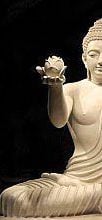 “Taking Refuge in Evil Buddhas?”
“Taking Refuge in Evil Buddhas?”
What you say?
In my last post, I discussed this odd practice based on a talk that Jiryu gave a Green Gulch last month. Talking about refuge in evil Buddhas online and here at Wild Fox, sounds like one of the catches is about “refuge” – what is it?
Very nice question, worthy of sitting calmly and contemplating so I won’t get all preachy here. This is just a little post with a bit about the meaning of the word “refuge,” a place of safety.
The phrase in Japanese that is translated “refuge” is “namu kie.”
According to my unreliable memory, Katagiri Roshi used to say that “kie” was more active than “refuge” – more like throwing ourself into Buddha’s house.
But I wanted to check that memory so I Googled and came up with a piece by “An Appropriate Response: Coaching and Consultation” (how about that!?). Here’s what they have:
In Japanese, “I take refuge in Buddha,” is “Namu kie butsu”. “Namu” means honoring and acknowledging what and who inspire us, and expressing our dedication and appreciation to that. “Kie” means to wholeheartedly throw oneself into and to depend on. So “Namu kie butsu” is sometimes translated as “I wholeheartedly throw myself into the house of Buddha.” That’s the heart of taking refuge: returning to and throwing ourselves into now and now and now.
Given that I tend to be a suspicious person, I pushed the inquiry a bit further and asked Koun Franz (a real Soto priest who’s got some serious language skills but has been neglecting his excellent blog recently) what he thought. Here’s what he said,
I think the [An Appropriate Response] article covers “kie” fairly well. A quick search shows that by itself, it usually refers to religious conversion, which is interesting (also “devotion”). It’s always danger to dissect compounds, but the “ki” means “coming home,” and the “e” means something like “depend on,” so together, that actually covers a lot of ground. “Namu,” by the way, doesn’t mean much of anything–it’s a transliteration of Sanskrit (?), so the characters themselves only represent sound, not meaning (literally they mean “south nothing”). The dictionary lists praise, amen, hail, etc., but combined with “kie butsu,” that makes for some awkward translation, no matter how you do it.
I think it’s probably a very modern notion, but I, too, have always liked the “refugee” version of taking refuge. Very Zen-y to take refuge in such a way that you have no safe place to stand. I’m not sure that the idea of “throw yourself into,” as a translation, has legs, but as an interpretation, I’d say it’s right on.
Amen to coming home to, and relying on, Buddha!
Buddha immersion! Amen!
I hope that doesn’t help explain “refuge” but adds some grist for the practice mill.











